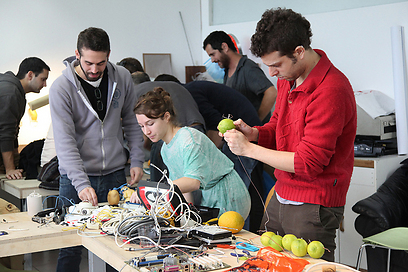
Green chic
צילום: הנס מוריץ
Shenkar presents: Green chic
Israel's top fashion academy jumps on eco-friendly design trend, says prêt-à-porter can be vibrant green
Fashion students at Israel's Shenkar College of Engineering and Design were recently given a unique challenge – creating innovative designs using surplus clothes deemed disposable by a local leading fashion retailer.
The project marks the growing green trend in the fashion industry, as it – much like its contemporaries in the consumer product sector – is becoming more eco-conscious. The industry is making a global effort to offer consumers fashion items made from recycled materials, turning the "reclaimed" into super-chic must-haves.
As part of this growing trend, students at the Master's program of Shenkar's Faculty of Fashion Design have recently taken part of a project exploring "design as an engine of social impact."
The students were also asked to design their clothes in the spirit of a potential target-market, and find an association that represented that market.
The items designed were then mass-produced and sold on discount, or designed as a unique one-piece, to be auctioned off. All proceeds went to the respective associations.

The workshop (Photo: Tami Dahan)
"The clothes we were given to work with were surpluses garments that were not sold, as well as items that had small defects," class instructor Ayelet Carmon explained.
"We're used to thinking of surplus from purely industrial point of view, but many companies actually get stuck with inventory because the law states that you can't import goods that are not for immediate sale. Since the system encourages buying in bulk to get a better price, importers later face having to deal with surplus inventory."
But if the students are using ready-made garments, where is the challenge? Carmon summed it up with "scarcity": "Students would start working with something and then literally run out of it, so they had to improvise. The projects approach was 'what you get is what you use.'"
The growing trend has been noted by retail giants as well: in December, Sweden's H&M announced recently that as part of its social and environmental responsibility practices, it will offer customers a chance to recycle their old clothes.
The Israeli franchise is included in the venture, which will span 48 nations worldwide.










